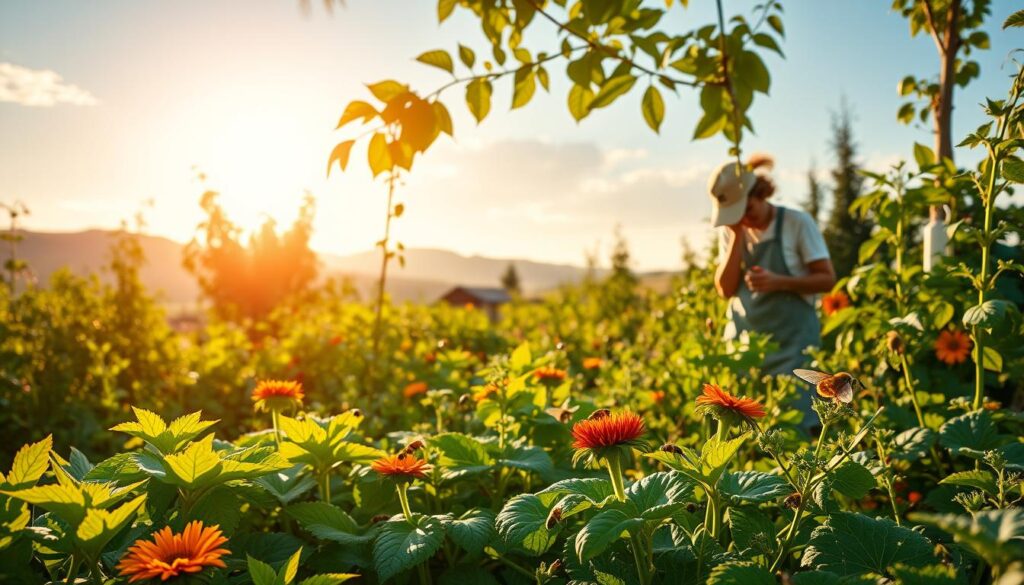More people now prefer organic gardening to keep their crops healthy and help the environment. This article covers key organic gardening methods. These methods focus on making your garden thrive in a sustainable way.
You will learn about selecting the right spot, improving soil, managing pests, and watering properly. All these tips are aimed at creating a strong, productive organic garden.
Anúncios
Understanding Organic Gardening Principles
Organic gardening is getting popular as more people want to farm in eco-friendly ways. It means growing food sustainably and in harmony with nature. Knowing what organic gardening is helps us see its value in modern farming.
Definition of Organic Gardening
Organic gardening follows rules set by the USDA’s National Organic Standard. It avoids synthetic stuff like fertilizers and pesticides to protect our ecosystem’s health.
Anúncios
Principles and Practices
At the heart of organic gardening is making soil healthier and managing nutrients naturally. Sustainable gardening includes:
- Building healthy soils rich in organic matter.
- Implementing crop rotation to prevent soil depletion.
- Utilizing integrated pest management systems to minimize ecological impacts.
These methods produce healthy food and make gardening sustainable for the future.
Site Selection for Organic Gardening
Picking the best spot is key in organic gardening. It affects how much sunlight your garden gets and the health of your plants. Choosing the right place helps plants grow well and give you lots of produce, avoiding problems poor conditions might cause.
Light Exposure
It’s important to choose a garden spot that gets at least six hours of direct sunlight every day. Good sunlight is key for making food in plants, leading to strong growth. If plants don’t get enough light, they won’t grow properly and you’ll get fewer fruits and vegetables.
Soil Drainage and Fertility
It’s also crucial to find a spot with good soil that drains water well. This keeps plant roots from rotting. Look for signs of water standing in the area to check if the soil drains well. You can also learn a lot about soil health by looking at the plants already growing there or by getting a soil test done.
Having the right soil nutrition is important for your garden’s success. Good soil helps plants grow strong and healthy, leading to more produce.
Choosing Organic Seeds and Plants
Starting an organic garden means picking the right seeds and plants. It’s important to learn about organic seeds to make your garden thrive. Knowing how to choose organic gardening plants is also key for a healthy, sustainable garden.
Importance of Organic Seeds
Organic seeds stand for gardening in tune with nature, using no synthetic chemicals or GMOs. They help keep your garden’s biodiversity alive and promote strong, healthy soil and plants. Choosing organic seeds means you’re helping create a balanced ecosystem that supports both plants and the animals around them.
Considerations When Selecting Plants
Picking plants that suit your area’s weather is crucial for a successful organic garden. The ability of plants to withstand pests and adapt to your garden’s conditions matters a lot.
- Assess local growing conditions.
- Research pest-resistant varieties.
- Consider the plants’ adaptability to your garden space.
Looking at these points will help your garden do well and allow your plants to thrive in their setting.
Soil Health and Fertility Management
Managing soil fertility is key in organic gardening. Focusing on soil health helps create a nutrient-rich environment for crops. By adding organic materials and green manures, we ensure plants get the nourishment they need.
Building a Nutrient Reservoir
Organic gardeners can build a strong nutrient base in the soil. They do this by adding compost, aged manure, and cover crops. These materials keep the soil healthy. They act like a sponge, holding water and nutrients for plants to use.
The Role of Organic Matter
Organic matter plays a vital role in organic gardening. Adding compost, for example, boosts soil structure and fertility. It helps grow beneficial microbes that plants need. These microbes break down organic matter, freeing up nutrients for plants.
Fertilizing Organic Gardens Effectively
Using natural materials to fertilize organic gardens helps the soil and plants grow better. It’s important to know what kinds of organic fertilizers are out there. Also, learning how compost benefits the soil can make a big difference in how well your crops grow.
Types of Organic Fertilizers
Organic fertilizers are a better choice for the environment than chemical ones. They include:
- Animal manure
- Bone meal
- Fish emulsion
- Alfalfa meal
- Green manures
These options give plants key nutrients and help keep the ecosystem healthy. This is crucial for successful organic gardening.
Using Compost for Enhanced Soil Health
Compost is very important in organic gardening. It does many things:
- Fertilizes plants naturally
- Improves soil’s ability to hold water
- Makes nutrients more available to plants
This creates a rich soil that’s great for plants. Using compost is key to a strong organic garden.
Pest Management in Organic Gardening
Keeping your organic garden healthy requires effective pest management. It’s possible to control pests in organic gardens without synthetic chemicals. By preventing pests and using natural remedies, your crops will thrive and the environment will be safe.
Preventative Strategies
Preventing pests is key to organic pest control. Here are important strategies:
- Practice crop rotation to disrupt pest life cycles.
- Keep plants healthy with the right water and nutrients.
- Space plants well for good air flow.
- Regularly clean up leaves and remove sick plants to limit pest homes.
Using these methods helps keep pests away. This makes controlling them easier.
Using Beneficial Insects
Another way to control pests organically is by using helpful insects. They naturally keep the garden balanced. Think about adding:
- Ladybugs, they eat aphids and other pests.
- Lacewings, they’re great at eating larvae and aphids.
- Parasitic wasps, they take care of caterpillars.
Creating a welcoming place for these insects means fewer pests. This reduces the need for chemicals.

Weed Control Techniques
Keeping weeds away is key for a healthy organic garden. The right methods can stop weeds from growing. This lets the plants you want to grow better. We’ll look at different ways to do this. These include using mulches, cover crops, and green manures to make your garden better.
Importance of Mulching
Mulching is a great way to control weeds. It makes a barrier that stops weeds, keeps the soil moist, and keeps it healthy. This helps your garden grow well without using chemicals. Organic mulches like straw, wood chips, and grass clippings are good. They break down over time, making the soil richer.
Cover Crops and Green Manures
Cover crops are great for weed control when your garden is resting. They keep weeds away and make the soil better. Planting cover crops adds organic matter and stops erosion. Green manures are special cover crops that you mix back into the soil. They improve soil health and make gardening more sustainable. All these practices together help your garden flourish.
Irrigation Techniques for Healthy Crops
Using the right irrigation strategies is key for keeping crops healthy and getting the most from organic gardening. It’s about knowing how to save water while also giving plants what they need for growth. This balance is good for both the plants and the environment.
Water Conservation Strategies
Drip irrigation is top-notch for giving water right to where the plants need it— their roots. It can cut water use by 25% to 70% over old-school ways, making it a win for saving water. Drip irrigation keeps water off leaves, cutting down on disease, and keeping moisture levels steady. This helps crops grow stronger and maybe even boosts how much you harvest. Plus, drip systems work with all kinds of gardens, from raised beds to rows.
Effective Watering Practices
Knowing how to water correctly is crucial for crop health and eco-friendly gardening. Watering less often but deeply makes roots tough and able to get water and food better. This saves water and helps avoid too much moisture, which can lead to root rot. Aim water at the plant’s roots to lower water loss and keep diseases at bay.
Checking soil moisture with tools like rain gauges and soil probes helps to know when to water. Watering in the morning lets leaves dry during the day, which helps prevent diseases. Adjusting watering based on what each plant needs and the weather can make your garden thrive and use resources wisely.
Seasonal Organic Gardening Practices
Adopting seasonal gardening techniques is key for a successful organic garden. By following practices like crop rotation and understanding when to plant, gardeners can see healthier plants. And they get more fruitful harvests all year long.
Crop Rotation Importance
Crop rotation is essential in organic gardening. It means changing which crops you plant every year to avoid using up soil nutrients. This keeps the soil healthy so each plant grows better. Plus, it stops certain pests and diseases from becoming a big problem, keeping the garden diverse and healthy. By moving crops around, gardeners keep the soil rich and the environment balanced.
Seasonal Planting Tips
Knowing what to plant and when is vital for organic gardening. Following a planting calendar helps pick the right crops for each season, leading to steady harvests. In the spring, plants like leafy greens and root vegetables do well. Summer is great for growing tomatoes and peppers. And in the fall, it’s time for crops that prefer cooler weather. Planning helps your garden grow strong through all kinds of weather.
Harvesting and Post-Harvest Techniques
Good harvesting methods and careful handling after harvest are key to the quality of organic food. Picking the crops at the right time ensures they taste best and offer the most nutrition. We’ll look at the top ways to harvest and store organic foods.
Best Practices for Harvesting
Picking vegetables when they’re fully grown is crucial for the best flavor and nutrients. Crops like cucumbers, squash, and sweet corn should be harvested when they’re just the right size. If not, they might get too big, tough, or even go bad. Harvesting in the early morning is best. That’s because veggies regain water overnight, which makes them crisp and sweet. Using gentle tools, such as scissors or pruners, helps avoid damage to plants and soil. Harvesting often also means plants will keep producing, giving you more fresh veggies over time.
Storing Organic Produce
Storing organic produce the right way is key for keeping it fresh. Cooling it down right after picking helps slow down aging and reduces rotting. There are different ways to cool veggies, like using cold water for greens. Picking the correct storage containers also matters; for example, store root vegetables in airy bins without washing to prevent mold. You need to control the temperature and humidity; root veggies do best around 32°F with plenty of moisture, while fruits like it a bit warmer. Good air flow in storage stops moisture buildup, keeping mold away. These steps after harvesting can really improve the quality of your organic produce.
Conclusion
Organic gardening does more than just produce healthy crops. It creates a lively ecosystem that helps both plants and the environment. Following the advice in this article is key to making a garden that’s sustainable.
Improving soil health and using natural pest control are vital. These steps make plants strong and cut down on chemical use. Such efforts keep nature in balance and lead to better harvests.
Starting an organic garden is rewarding and crucial for the earth’s future. It’s about more than just growing plants. By choosing sustainable methods, you are building a better world. Join the organic gardening movement and see your garden flourish for years to come.
FAQ
What is organic gardening?
Why is soil health important in organic gardening?
How do I select the right site for organic gardening?
What are organic seeds, and why are they important?
How can I naturally manage pests in my garden?
What types of organic fertilizers should I use?
How can mulching benefit my organic garden?
What watering techniques are best for organic gardening?
Why is crop rotation important in organic gardening?
What should I consider when planning my planting schedule?
What are some best practices for harvesting organic produce?
How should I store organic produce to maintain freshness?
Content created with the help of Artificial Intelligence.



